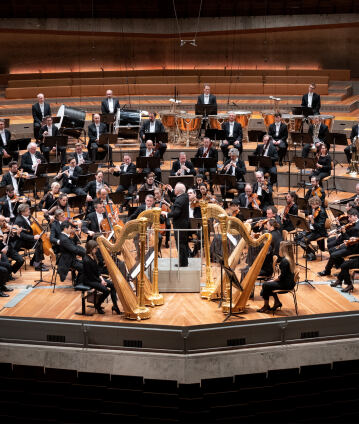Daniel Barenboim and Emmanuel Pahud

Hector Berlioz wrote countless love letters to actress Harriet Smithson – none were ever answered. The Symphonie fantastique became the composer’s outlet: the depiction of an extreme love drama in which the lover is murdered and the murderer is executed. The conductor of the spectacular score here is Daniel Barenboim. The programme also includes the flute concertos by Ferruccio Busoni and Jacques Ibert – captivating music which is dynamic, transparent and surprising. The soloist is Emmanuel Pahud, principal flute of the Berliner Philharmoniker.
Hardly any work in music history is as closely associated with the burlesque and the surreal as Berlioz’s Symphonie fantastique. The programme that the composer prefixed to the printed editions of the score develops in the imaginary world of a musician who, “in a fit of amorous despair”, has poisoned himself with the fashionable drug of the time, opium. “The narcotic dose, too weak to result in death, plunges him into a heavy sleep accompanied by the strangest visions” (Berlioz).
The work, however, soon escalates into a heated succession of contradictory emotions and fantasies – very similar to what is described in Thomas De Quincey’s novel Confessions of an English Opium-Eater, published in French translation in 1828: “A theatre seemed suddenly opened and lighted up within my brain, which presented nightly spectacles of more than earthly splendour. For this and all other changes in my dreams were accompanied by deep-seated anxiety and gloomy melancholy, such as are wholly incommunicable by words.”
Here, Daniel Barenboim presents Hector Berlioz’s dramatic nocturne, whose premiere in December 1830 marked a turning point in music history. Emmanuel Pahud, principal flute of the Berliner Philharmoniker, provides light contrasts with the flute concertos by Ferruccio Busoni and Jacques Ibert, whose brilliant colours set their own course in the direction of impressionistic Neoclassicism.
© 2020 Berlin Phil Media GmbH
Related interviews